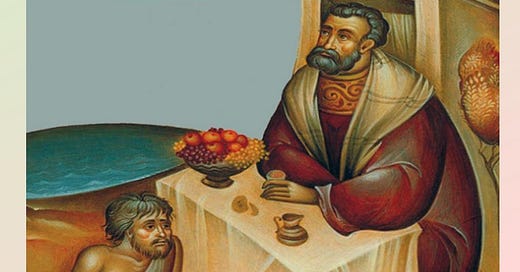Jeremiah 17:5-10; Psalm 1:1-4,6; Luke 16:19-31
The writer of Psalm 1 agrees with the prophet Jeremiah that there are two types of people: those who trust in themselves and those who trust in God. Furthermore, they also agree that those who trust in themselves have no future. Jeremiah compares them to "a barren bush in the desert," and the Psalmist likens them to "chaff which the wind drives away." On the other hand, those who trust in the Lord are like "a tree planted near running water" (Jer 17:7; Psalm 1:3). These two types of people appear in Jesus' parable of the rich man, "who dressed in purple garments and fine linen and dined sumptuously each day," and Lazarus, "covered with sores, who would gladly have eaten his fill of the scraps that fell from the rich man's table" (Luke 16:19-21). The rich man ends up in Hades, while Lazarus rests on "the bosom of Abraham."
Hades is an "interesting place." There is neither lavish food nor water. There are no servants who would offer a glass of drink to their thirsty master, and the rich man's orders are not being carried out (Luke 19:23-31). However, in Hades, the rich man's eyesight improves. He can now see from afar the one he did not see during his lifetime (Luke 19:24). It is also worth realizing that all of the rich man's requests are turned down. Abraham refuses to mediate between the rich man and Lazarus, and he declines to make Lazarus the rich man's servant.
Jesus' parable reminds us that those who trust in the Lord are characterized by their concern for others. The rich man could have avoided this fate by opening his Bible and listening to Moses and the Prophets: "You shall open wide your hand to your brother, to the needy and to the poor, in your land" (Deut. 15:11); "Share your bread with the hungry" (Is. 58:7). However, the message of the parable goes beyond that, pointing to the Paschal Mystery of Jesus Christ. The last words of Abraham to the rich man, concerning his five brothers who also live in self-indulgence and neglect the needs of others, are: "If they will not listen to Moses and the prophets, neither will they be persuaded if someone should rise from the dead" (Luke 16:31).
The risen Christ revealed to His disciples that Moses and the prophets wrote about His suffering, death, and resurrection. Jesus had to suffer for our salvation and then enter into His glory (Luke 24:26-27, 44). Thus, we see the unity of Scripture: "The New Testament lies hidden in the Old, and the Old is unveiled in the New" (Saint Augustine). The reading of the Old Testament leads us to grasp the mystery of God's salvation in Jesus Christ. It also transforms our minds and hearts. Blessed is the one who "delights in the law of the LORD and meditates on his law day and night" (Psalm 1:2).
Nearly two thousand years ago, the good news that "the Lord is risen" was proclaimed to the world for the first time (Acts 2:32) by those who saw the risen Christ. In their proclamation, they indicated how Jesus fulfilled the prophecies of Scripture. As Christians, we need to know our Bible and the Gospels should be known by heart. For St. Jerome, the Gospel was the Body of Christ, and "ignorance of Scripture is ignorance of Christ." It was ignorance of Scripture that led the rich man and his five brothers to a life of self-indulgence and selfishness with tragic consequences. Centuries later, Jesus revealed to St. Teresa of Avila that "all the evil in the world is derived from not knowing clearly the truths of sacred Scripture."




